Top 25 Open-Source Solutions for Managing Hospitals and Clinics (EMR, EHR, HIS, and Clinical Practice Management)
Table of Content
What is a Hospital Management Information Systems?
Hospital Management Information Systems (HMIS), Electronic Medical Records (EMR), and Electronic Health Records (EHR) play a central role in today's advanced healthcare management. Actively revolutionizing the medical industry, these software solutions are integral tools that help streamline hospital operations, enhance the level of patient care, and optimize the overall management of health data.
By integrating a wide range of healthcare processes within a single system, they ensure a high level of efficiency in administration, covering everything from the moment a patient registers to when they are billed for the services received.
The utilization of these systems brings forth a multitude of benefits, including, but not limited to improved patient outcomes, a significant reduction in errors, and a noticeable increase in operational efficiency.
What kinds of solutions are available for managing Hospitals and Clinics?
- HIS: Hospital Information System, a complete hospital management system.
- ERP: Enterprise Resource Planning Solutions, some ERP are built to have a large ecosystem of extensions and with a vast community that added many healthcare management modules.
- EHR: Electronic Health Records.
- EMR: Electronic Medical Records.
- Clinic and practice management.
Why using Open-source to manage hospitals?
As open-source options become increasingly available, they provide a cost-effective alternative for healthcare facilities. This is especially advantageous for resource-constrained settings as it allows them the flexibility to adapt the system to their specific needs, while also benefiting from the support and innovation of a global community.
These systems, thus, contribute to making healthcare more accessible and efficient, marking a new era of digital health management.
How can open-source software benefit hospital operations?
Open-source applications provide numerous benefits for managing hospitals and clinics. These benefits are due to the fundamental principles of open-source software: transparency, collaboration, and freedom.
- Cost-Effectiveness: Open-source software is typically free to use, distribute, and modify. This means hospitals and clinics can implement and customize these applications without the significant expense of proprietary software licenses.
- Transparency: With open-source applications, the source code is available to everyone. This transparency allows hospitals and clinics to audit the code for security vulnerabilities or other issues, providing an additional layer of trust and reliability.
- Customization: Open-source apps can be tailored to meet the specific needs of a hospital or clinic. Developers can modify the code to add features, integrate with other systems, or optimize the user interface for their staff's workflow.
- Community Support: Open-source projects often have active communities that provide support, share ideas, and continuously improve the software. This can lead to more rapid innovation and problem-solving compared to proprietary software.
- Interoperability: Open-source applications are often developed with interoperability in mind, making it easier to integrate them with other systems in the healthcare ecosystem. This can result in more streamlined and efficient operations.
- Longevity: Unlike proprietary software, open-source projects are not dependent on the survival of a single company. If the original developers stop maintaining the application, the community can continue to use, modify, and support it.
By adopting open-source applications, hospitals and clinics can benefit from cost savings, increased transparency, customization options, community support, interoperability, and longevity.
In this list, we offer you the best open-source solutions to manage hospitals and clinics.
1. Offline Hospital Management System Free
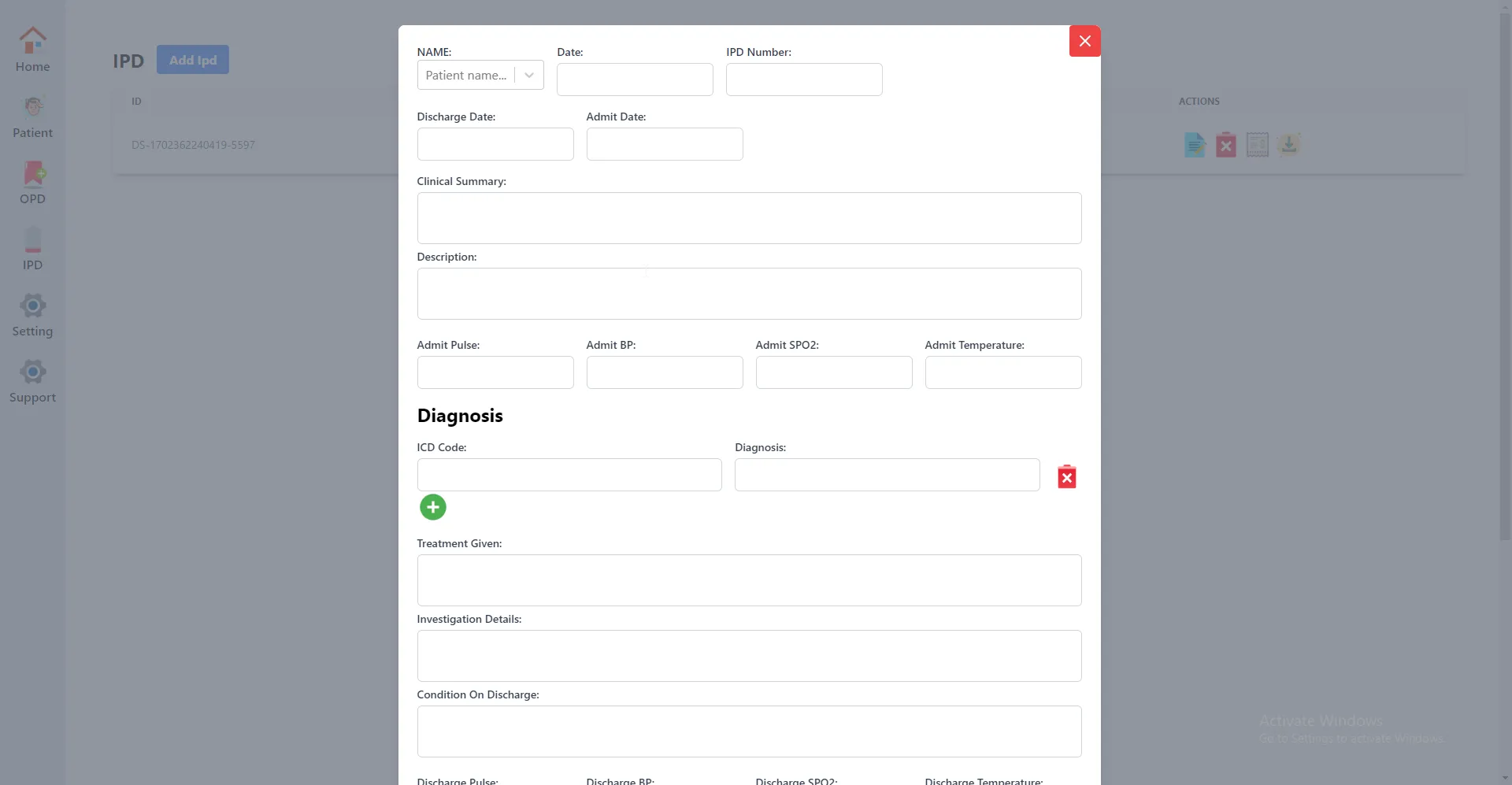
The Hospital Management System is a comprehensive software solution designed to improve the efficiency and effectiveness of healthcare facilities. It enhances patient care, increases operational efficiency through automation, improves financial accuracy, and enables data-driven decision-making.
Key Features
- Patient Management
- Appointment Scheduling
- Billing and Invoicing
- Pharmacy Management
- Laboratory Information System
- Staff Management
- Inventory Management
- Reporting and Analytics
Screenshots
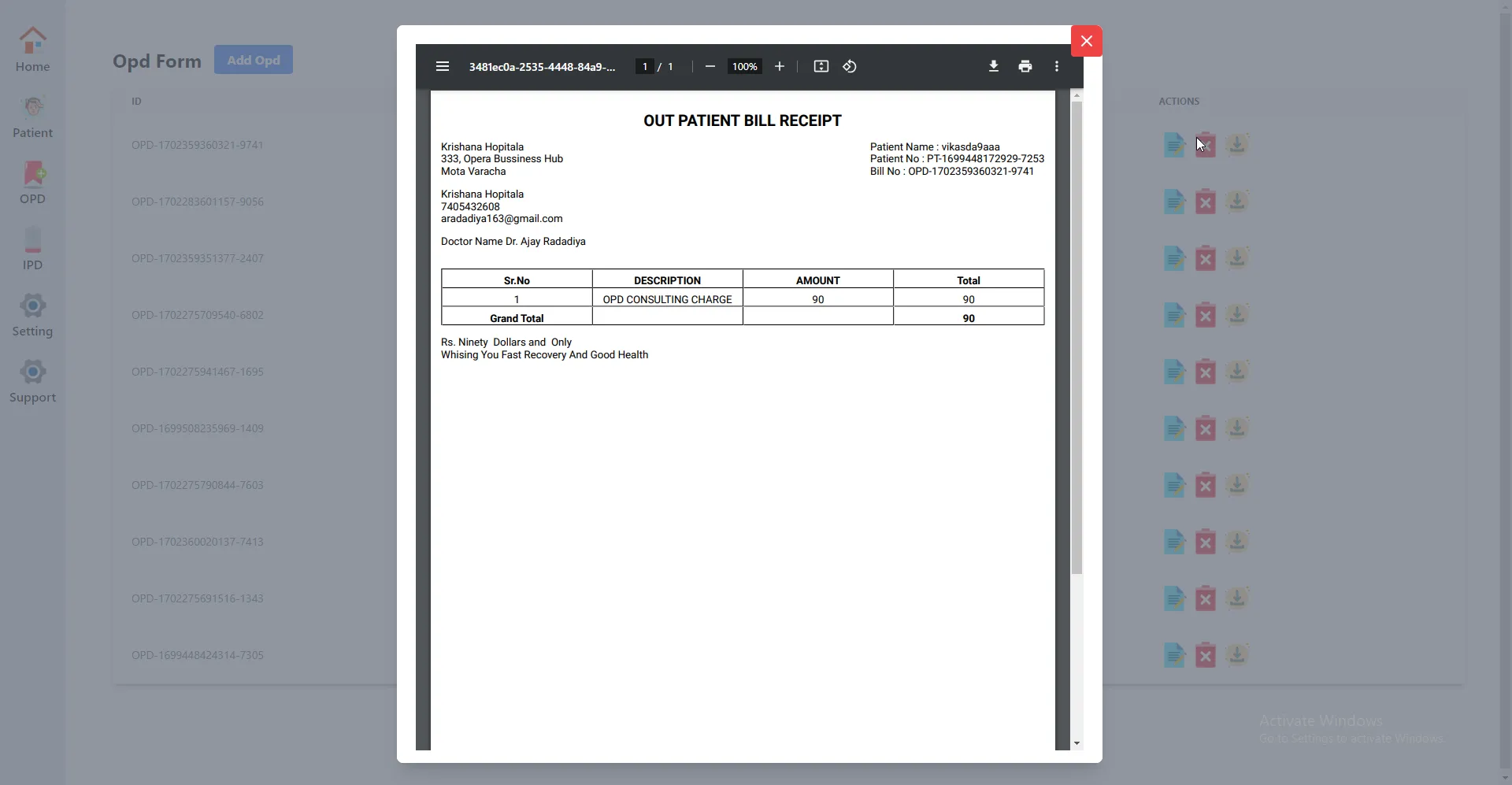

2. Medkey
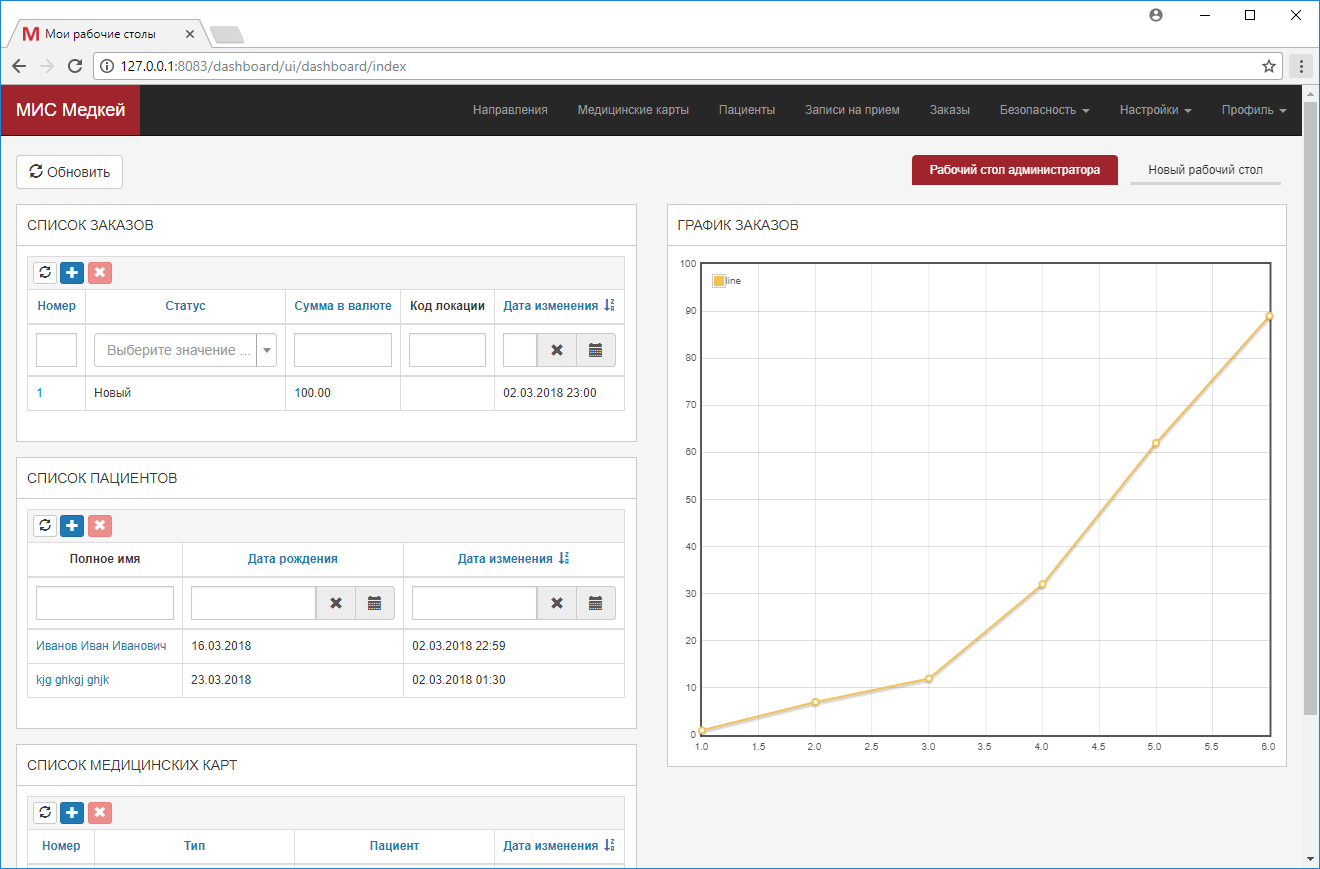
Medkey is a free and modular Hospital Information System currently in beta. It's developed by dgrudinin and is based on modern web technologies like PHP7, JavaScript ES7, and ReactJS, providing a fast, scalable server-side and user-friendly UX/UI.
Features
- Electronic Health Record
- Client Management Features (internal CRM)
- Ability to Integrate Other Software
- Ogranization Structure Management
- Employee Planning
- Medical Resources and Load Planning
Cons
- Lack of languages support
- Did not get updates for 6 years
3. HospitalRun
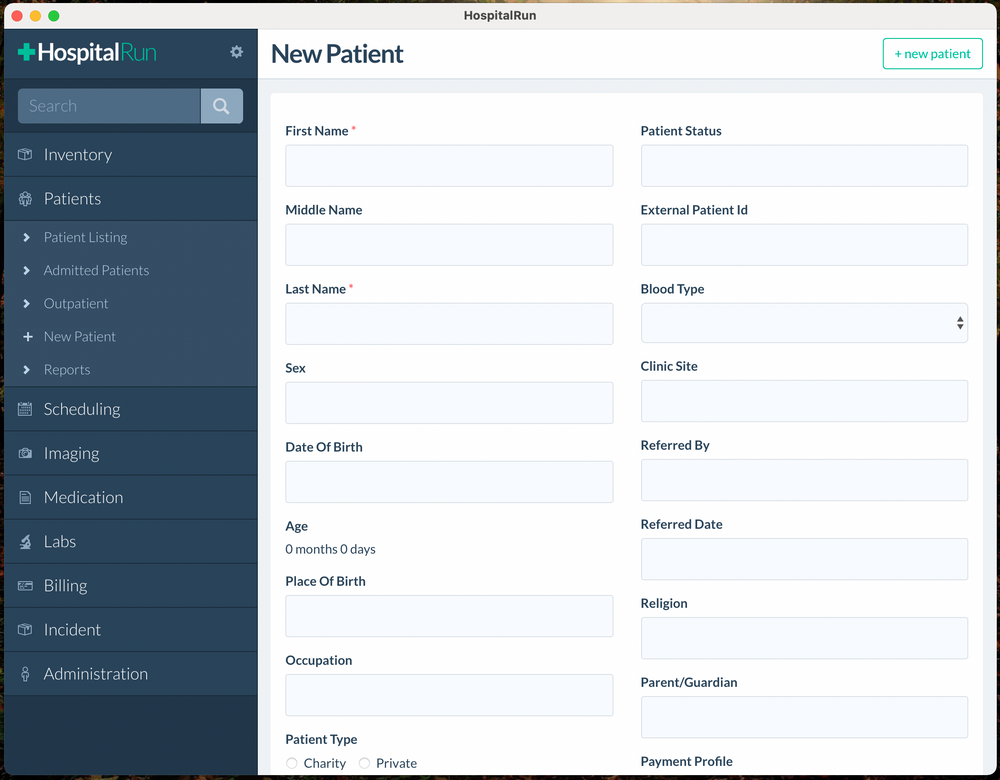
HospitalRun is an open-source project that offers modern hospital information system capabilities, notably an offline-first approach for remote clinics without reliable internet.
The project targets healthcare facilities in developing countries, emphasizing intuitive user experiences and efficient healthcare management.


4. OpenClinic GA
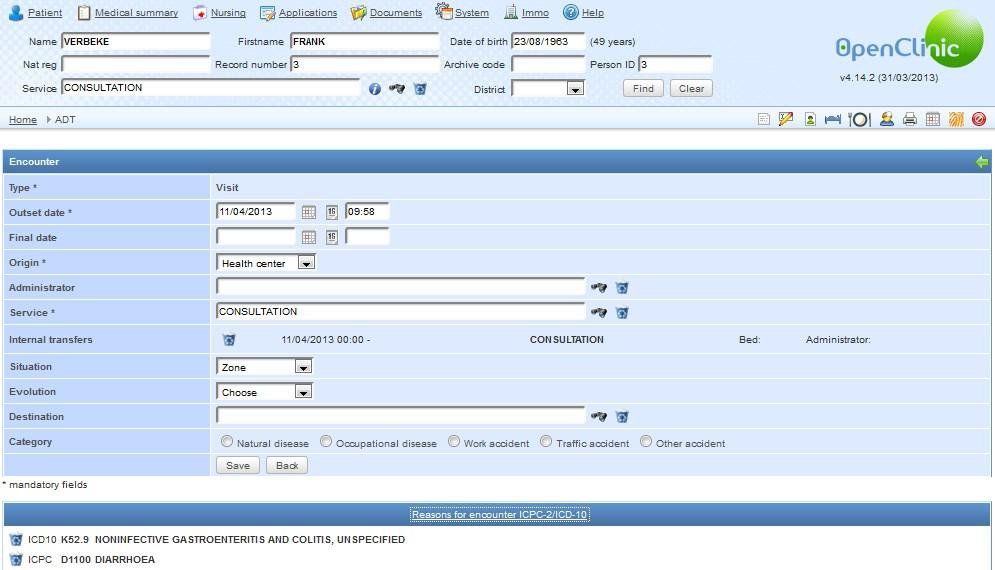
OpenClinic GA is an open-source hospital information management system that manages administrative, financial, clinical, lab, x-ray, pharmacy, and meals distribution data.
It has extensive statistical and reporting capabilities, is focused on limited resource hospitals, and supports multiple languages including English, French, Dutch, Spanish, and Portuguese.
Over 500 implementations of OpenClinic have been carried out, including in Rwanda, DRC, Mali, and Burundi, covering hospitals with 5 to 700 users. Country-specific localizations have been developed for numerous countries across the globe. Further information on OpenClinic implementations can be found at the Global Health Barometer website.
Features
- Focused on limited resource hospitals
- Multilingual: English, French, Dutch, Spanish, and Portuguese available
- Highly customizable using Java class extensions
- Full billing system with Central African, East-African, and Peruvian public and private health insurance management integrated
- Sophisticated statistics on mortality, co-morbidity, and costs of care
- Human resource management module available
- Full scheduling system integrated
- 3BT clinical thesaurus with validated coding aid for ICD-10 and ICPC-2
- Snomed CT coding (diagnoses) starting from version 4.0
- Full lab order entry and results management (LOINC coding supported). HL7 based interface with lab analyzer middleware solutions (Abbott AlinIQ/AMS)
- X-ray and pathology results management
- Complete ADT management
- Multimedia (pictures, video, audio) support
- Fingerprint identification using Digital Persona library
- Complete pharmacy stock management
- Integrates RxNorm based multi-lingual drug-drug interaction detection (interfaced to National Library of Medicine)
- Efficient database connection pooling with Primrose engine starting from version 4.0
- Mobile web interface with barcode recognition on Android devices
- Integrated solution for archiving of scanned documents
- Unlimited free usage (unlimited users, patients, beds, etc...)
- Integration of DCM4CHE/Weasis based PACS and DICOM-viewer solution
- HL7/FHIR API for structured data exchange with external applications
- WebRTC based module for tele-consultation
- WebRTC/Websockets based integration of Iristick SmartGlasses for tele-expertise
5. Open Hospital
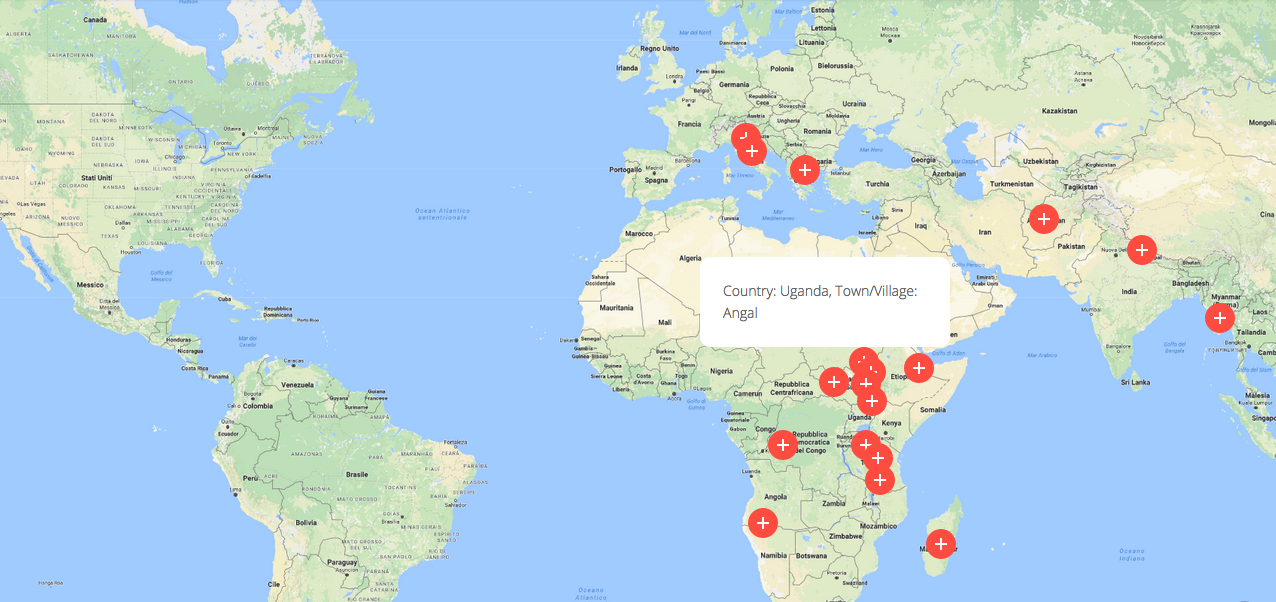
Open Hospital is a Hospital Information System developed by ISF to support the management of St. Luke Hospital in Uganda. The software, which is open-source, has been successfully installed and found useful by various hospitals.
Its key features include multiuser/multigroup and multilanguage support, extended patient registration, patient anamnesis, outpatient and inpatient department management, pregnancy management, pharmacy management with cost tracking, a laboratory module, and malnutrition control management.
Features
- Multiuser / Multigroup support
- Multi Language support (Arab, English, French, German, Italian, Spanish, Swahili, Portuguese)
- Extended Patient Registration (with picture)
- Patient Anamnesis
- Out Patient Department Visits
- In Patient Departments Management
- Pregnancy Management
- Pharmacy Management (with cost tracking)
- Laboratory Module
- Malnutrition control management
- Bills Management
- Vaccines database
- Therapy management
- SMS patient's reminder
- XMPP Communication (internal chat)
- DICOM viewer
- Reports & Statistics in PDF & Excel formats
License
GNU General Public License version 3.0 (GPLv3)
6. Clinic management program (Exir) - EMR
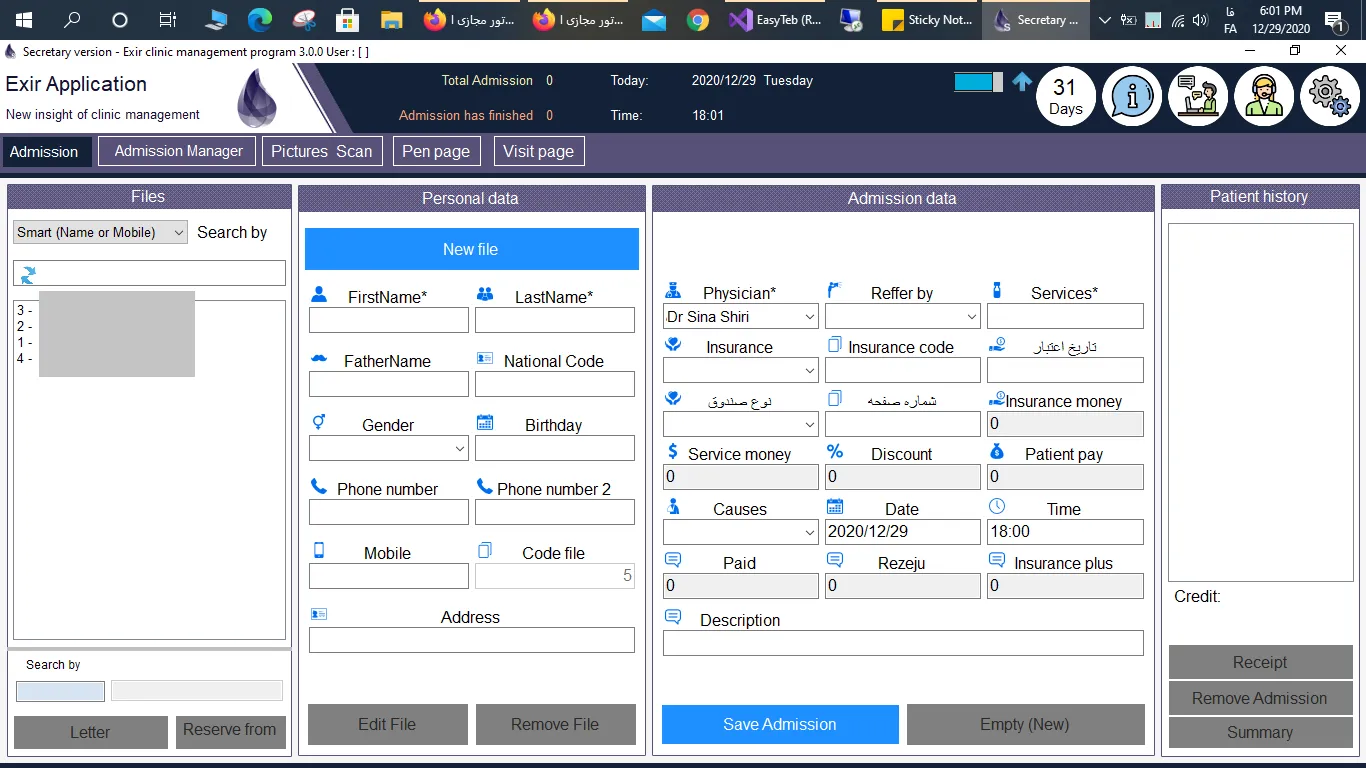
Exir Clinic management software is a program for managing medical records and patient health files.
It offers customizable medical record formats, including text, drawings, and pictures, and supports English, Arabic, and Persian languages. The software operates in both online and offline modes.
Features
- Customizable medical record formats (text, drawings, pictures)
- Supports English, Arabic, Persian languages
- Operates in both online and offline modes
- Visit page
- Pen stylus page
- Admission
- Archive of scan files
- Patient file
- Accounting
- Time table
- PWA Mobile portable files
- Report page
- Export excel of patient data
7. Medical DigitalRay MDR
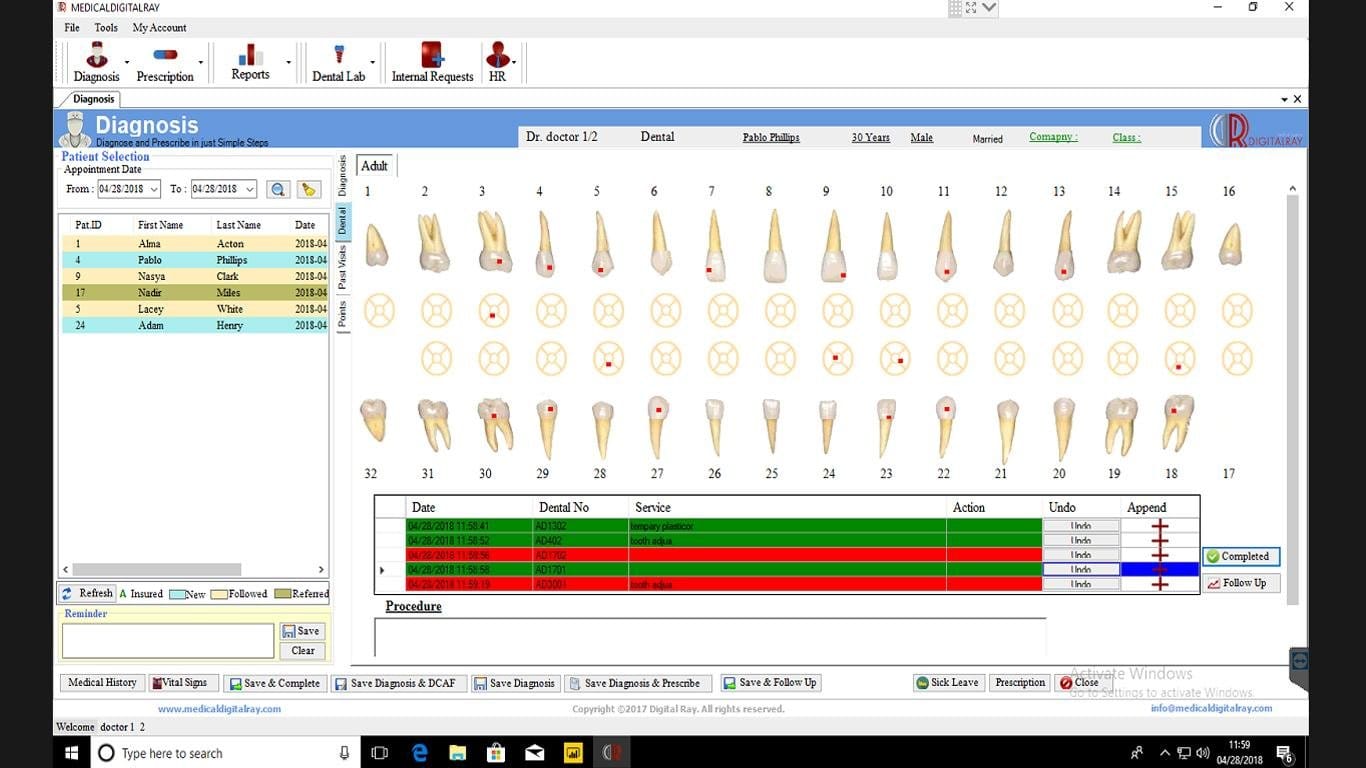
Medical DigitalRay MDR is an innovative system in healthcare designed to enhance the efficiency of medical, financial, and administrative processes in small hospitals, clinics, or polyclinics.
8. Hospital OS
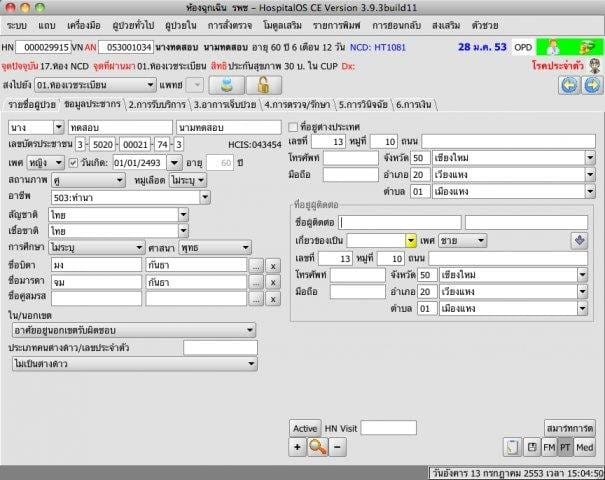
Hospital OS is a hospital information system designed for small-sized hospitals in Thailand, accommodating up to 100 beds or 200 out-patients per day.
Cons
- Did not receive updates for years
- Project status is unknown
- Lack of English and multilingual support

9. Elixir Aid
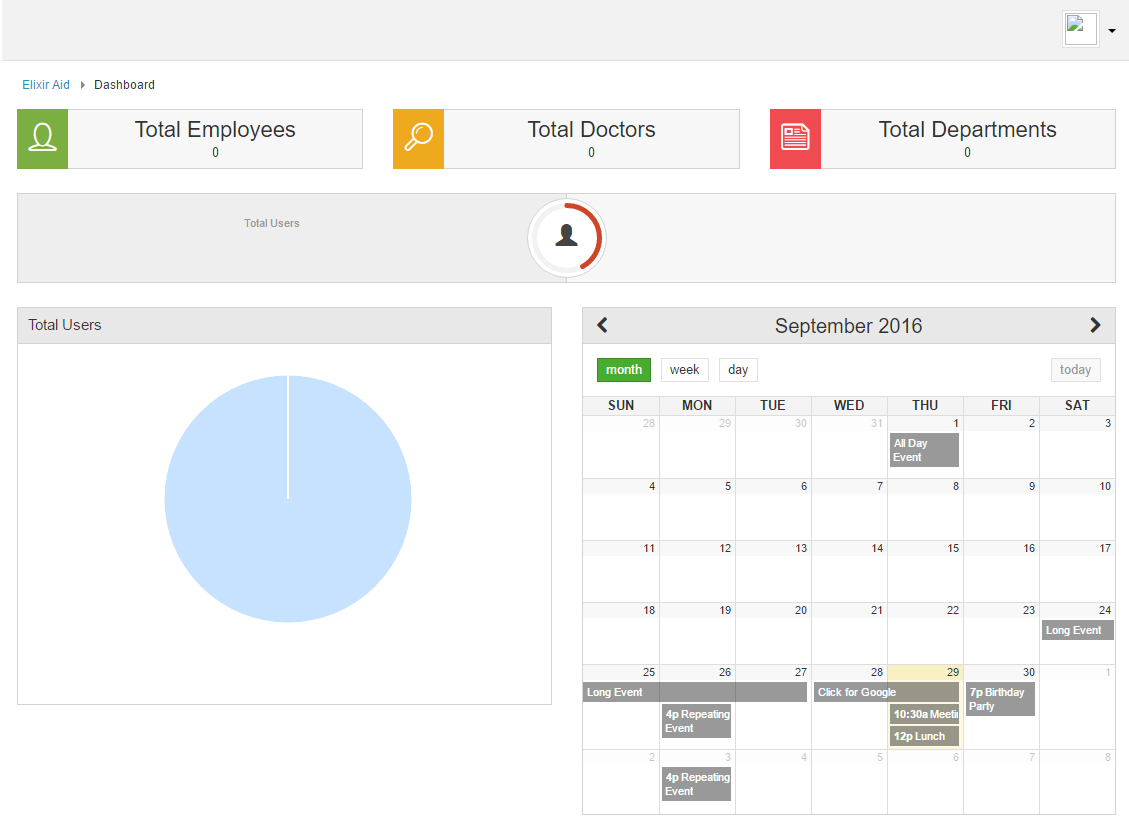
Elixir Aid is a self-hosted open-source hospital management software developed in the YII framework, providing comprehensive HR management solutions for healthcare institutions. It includes features for managing patient records, pharmacy, and medical staff profiles.
10. Ispirithalaya
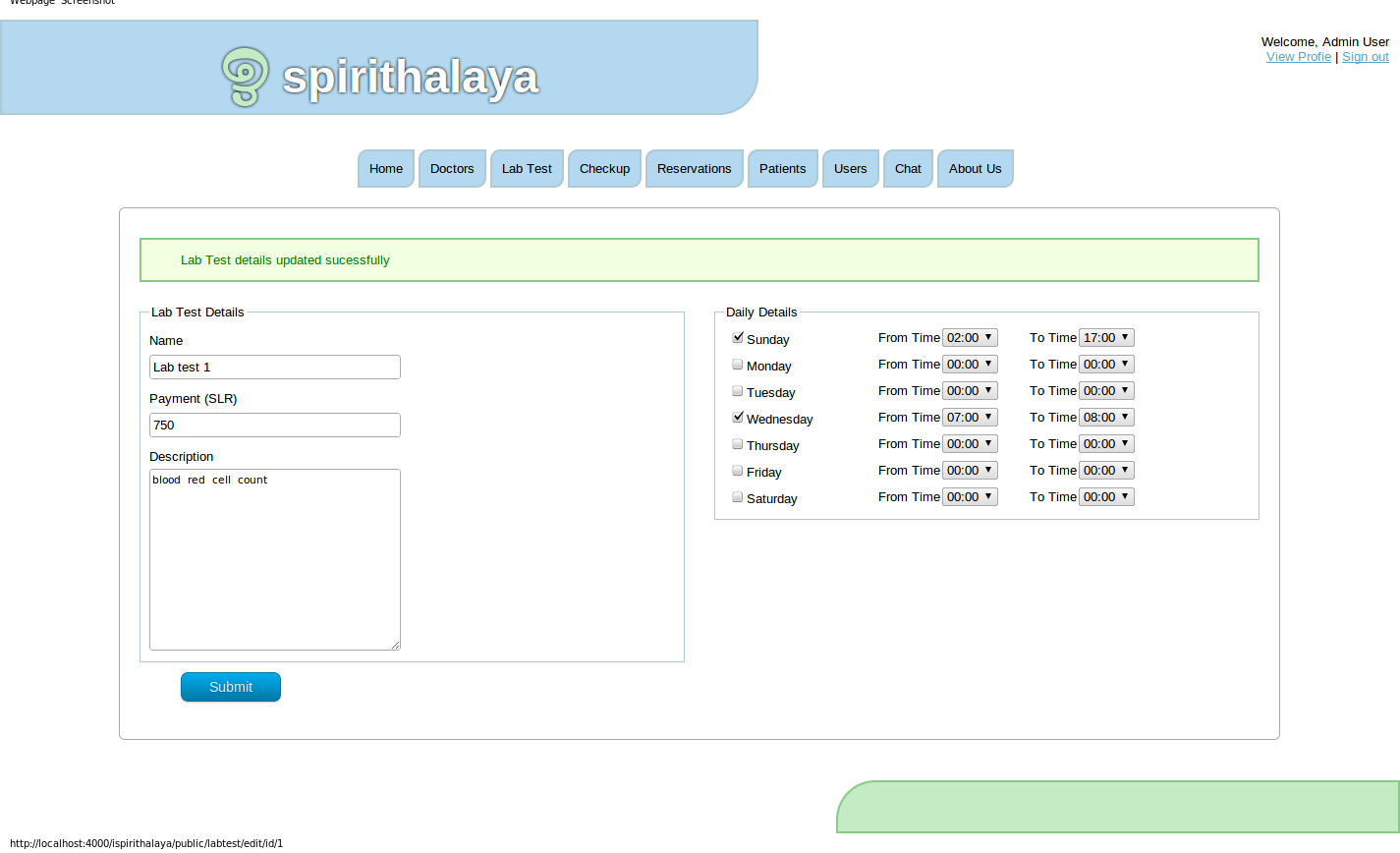
The Ispirithalaya system, is a free web-based self-hosted hospital system that is built with the Zend PHP framework and MySQL, offers features like e-channeling, checking, lab testing, and reservation. It facilitates communication between doctors and patients and includes a payment gateway integration.
11. Bahmni
Bahmni is an easy-to-use EMR & hospital system that combines and enhances existing open source products into a single solution, including OpenMRS for electronic medical records and patient management, OpenERP for inventory, billing, financial accounting, DICOM and PACS, and OpenELIS for laboratory management.
Bahmni is recognized as a Digital Public Good and is used in over 500 sites across 50 countries. For more details, you can visit their website here.
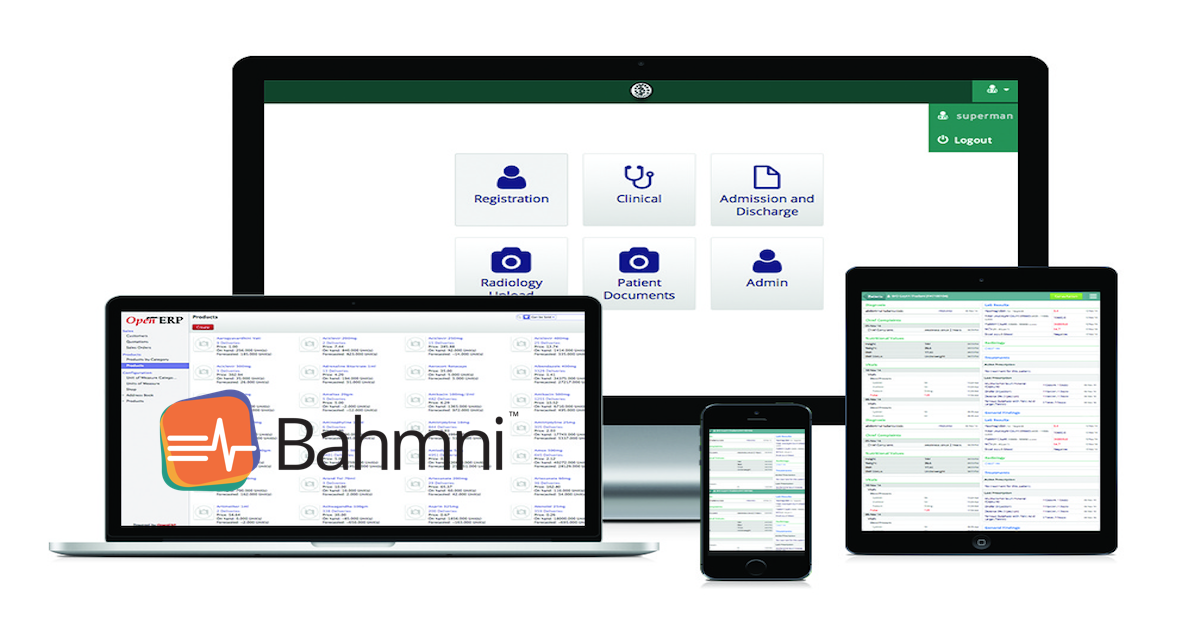
12. HOSxP
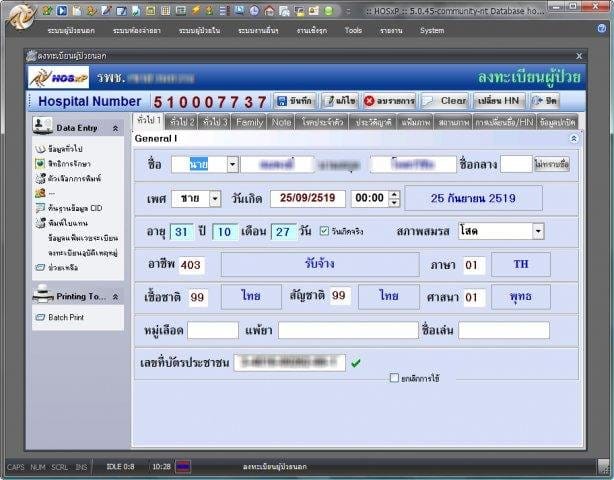
HOSxP stands as a robust client/server hospital information system, trusted by over 300 hospitals across Thailand. Its comprehensive suite includes modules for patient data, operations, medication, laboratory work, radiology, and financial transactions, making it a powerhouse in the healthcare industry.
Cons
- Lack of international language support

13. OpenMRS
OpenMRS is a global, free open-source Electronic Medical Records (EMR) platform designed to enhance healthcare delivery in resource-limited settings. It allows for the creation of customized EMRs to suit local needs, backed by innovative solutions and a robust, scalable platform.
Key Features
- Open-source platform
- Enhances healthcare delivery in resource-limited settings
- Allows for customized Electronic Medical Records (EMRs)
- Robust, scalable platform
- Modularity for easy customization and extension
- Robust API for integration with other healthcare and data systems
- Support for multiple languages
- Strong global community for continuous improvement and support
- Scalable, secure, and user-friendly
14. OpenEMR
OpenEMR is an open-source solution for electronic health records and medical practice management, offering a superior alternative to proprietary systems. It supports multiple languages, offers customization, and ensures full data ownership.
It includes advanced features such as scheduling, e-prescribing, medical billing, and lab integration, catering to diverse global medical practices.
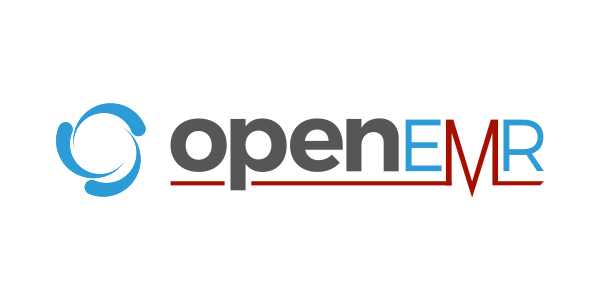
15. Hospital Management System
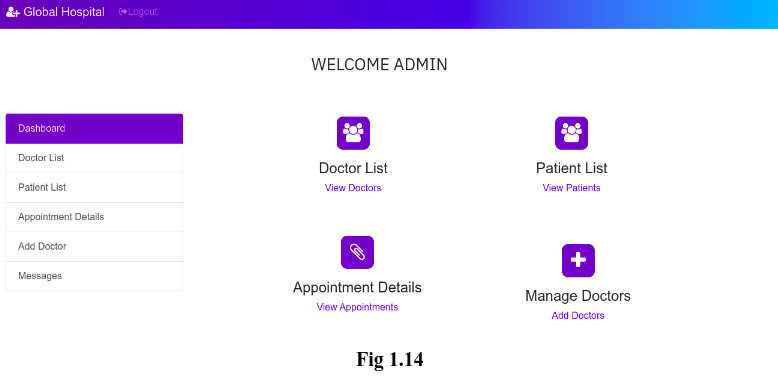
The Hospital Management System is a web-based self-hosted clinic app that uses PHP, MySQL, and Bootstrap.
It features separate login modules for patients, doctors, and administrators. Patients can create accounts, book appointments, and view their appointment history. The system also includes an 'About Us' page for hospital information and a 'Contact' page for feedback and queries.
16. Hospital Management Node.js
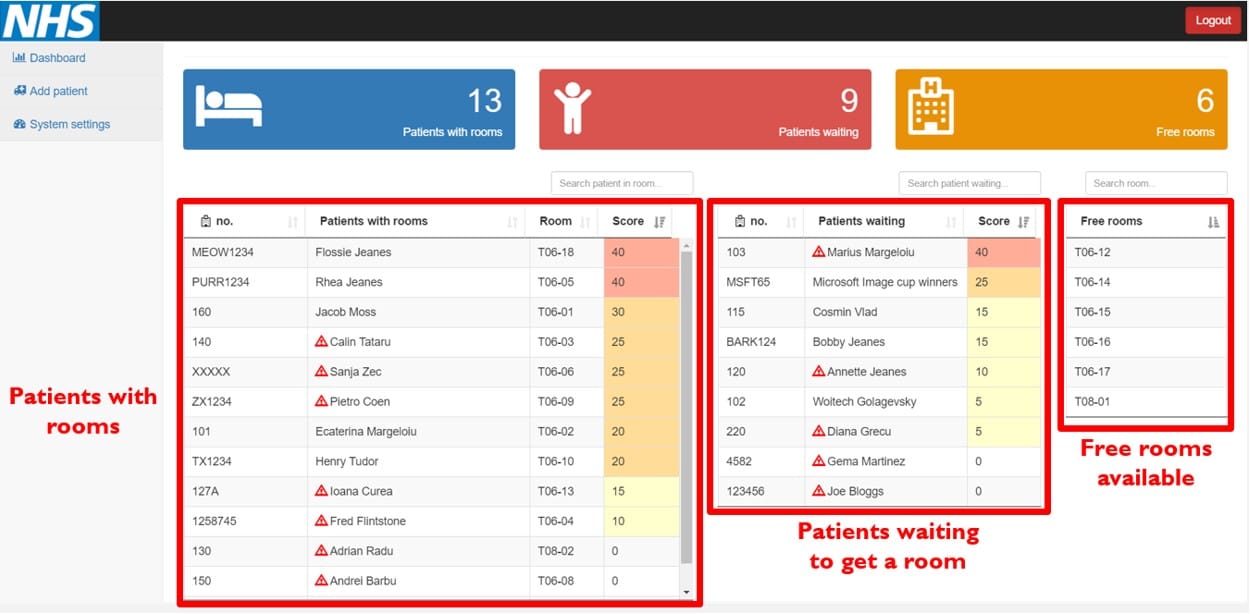
The web application serves as a hospital management tool, enabling real-time tracking of patients and their diseases, room assignments, and updating patient diagnoses.
It allows addition of new patients and computes their isolation priority score. The system settings act as a control center for managing diseases, rooms, and creating new accounts.
17. OpenPatientOS
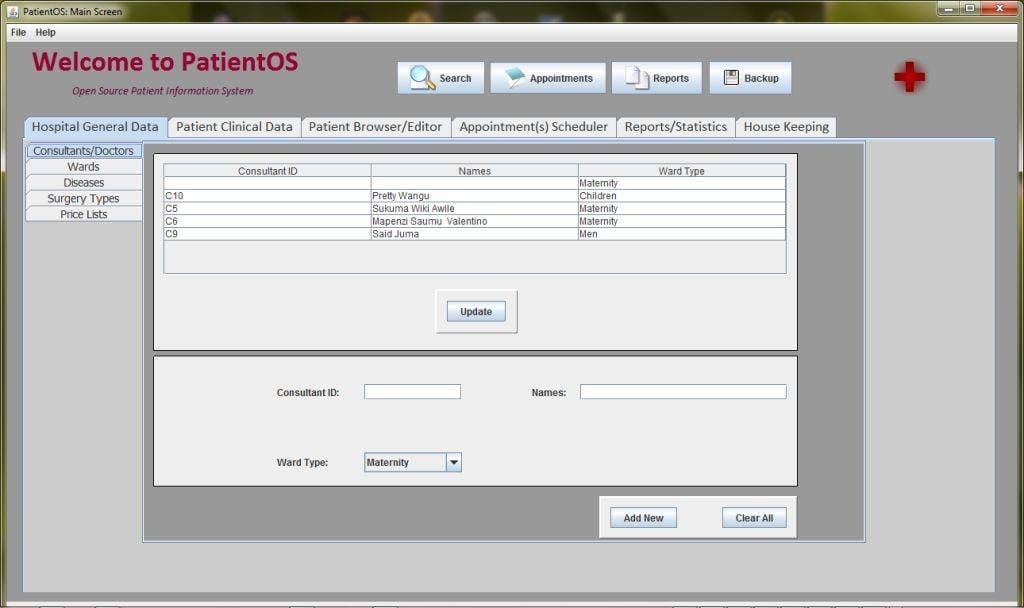
OpenPatientOS is an alpha-stage information system for managing patient records, suitable for small clinics or hospitals. It offers features for managing patient personal data and medical records. Installation involves importing the database dump, building the system in NetBeans IDE 7.0, and user feedback is encouraged.
Features
- Cross-platform: works for Windows, Linux, macOS
- User-friendly interface
- Patient personal data entry and management
- Patient medical records management
- Patient billing management system
- Reports creation
- Data backup
- Users management system
Cons
The app did not get any update for years
18. Hospital Management System
The hospital management system project uses SpringMVC, Hibernate frameworks, Bootstrap, MySQL, and Maven to address traditional hospital management issues.
It provides separate user accounts for doctors and staff, tracks patient data and visits, and offers features like easy addition and removal of employees, and PDF prescriptions. This Java-based web application ensures platform independence, high performance, and security.
Cons
- Created by one developer
- It does not get updates often
19. LibreHealth
LibreHealth is an open-source community developing free health IT solutions like electronic health records and radiology information systems. It emphasizes meritocracy, openness, outcome-driven projects, transparency, and user-driven development. It serves as an umbrella organization for various health IT projects.

20. Mountain Meadow Medical Record EHR
Mountain Meadow Medical Record is a quick, reliable, and customizable Electronic Medical Record (EHR) system designed for small offices.
It uses Microsoft .NET client programs and connects to a Microsoft SQL Server. The project is currently in beta and invites contributions to its further development.
21. OSCAR McMaster
The Open-Source Clinical Application Resource (OSCAR) is a web-based Electronic Medical Record (EMR) system. It is open-source and its code is accessible to all. The "OSCAR" or "OSCAR McMaster" name is used by those affiliated with McMaster who uphold standards of transparency, collaboration, quality, and ethical data stewardship. The code and the WAR file are available on the McMaster website.
It is available as a Debian Linux package which means it can be installed on Debian, Ubuntu, Linux Mint, and any Ubuntu/ Debian based distros.
22. CARE2X - Integrated Hospital Info System
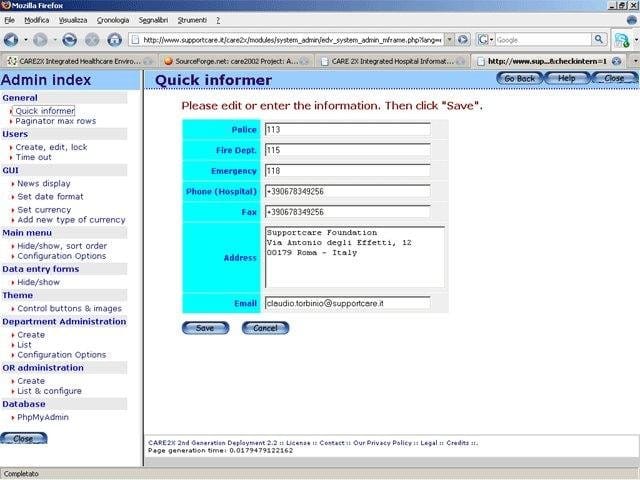
CARE2X is an integrated hospital information system that includes features for surgery, nursing, outpatient, wards, labs, pharmacy, security, admission, schedulers, repair, and communication. It supports multiple languages, has user-configurable WYSIWYG forms, embedded workbots, and is modular and scalable.
Cons
- Old obsolete interface and development packages
- No update for years
- Not recommended to use
23. Programa Engecare Saúde
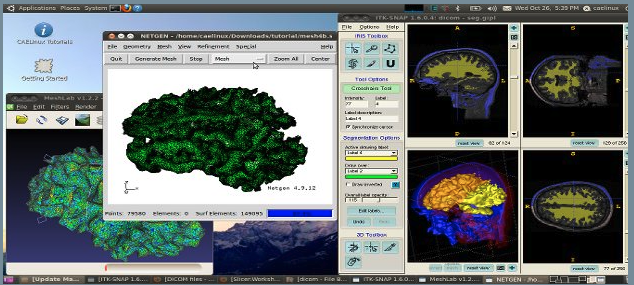
The Engecare Saúde program is an integrated hospital information system, featuring a practice management module, IHE, DICOM, and HL7. It's built with Scala & Web 2.0 and powered by PostgreSQL.
Key Features
- Integrated hospital information system
- Practice management module
- Compliance with IHE, DICOM, and HL7 standards
- Built with Scala & Web 2.0 and powered by PostgreSQL
- Developed at the Federal University of Espírito Santo by computer science and computer engineering students
- Supported by the Department of Health Care (DAS)
- Manages resources including patient and health professional registrations, appointments, electronic medical records, tests, reports, and inventory
- Serves as a source of clinical and administrative information for decision-making and shared communication between all professionals
- Supports research (clinical studies, epidemiological studies, quality assessment)
- Provides integrated management of clinical care
- Focus on primary care level, with hospitals continuing to be centers for diagnosis, care of complex problems, surgical procedures, and intensive care
- Interdisciplinary, collaborative team, guided by a horizontal organization. No professional is more important than another, as all contribute to the patient's recovery.
Cons
- Lack of English language support
- Lack of international support
24. GNU Health
GNU Health is a free, open-source health and hospital information system designed to aid the underprivileged. It offers comprehensive solutions for hospitals, health centers, and governments to improve health outcomes.
Its features include electronic medical records, hospital management, and health information systems, adaptable to various healthcare scenarios. It advocates for equity, social medicine, and public health.

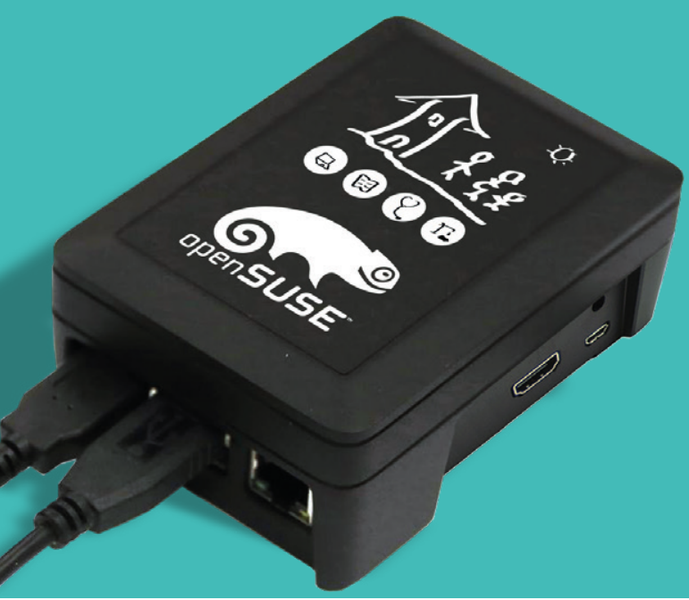
25. FreeMedForms
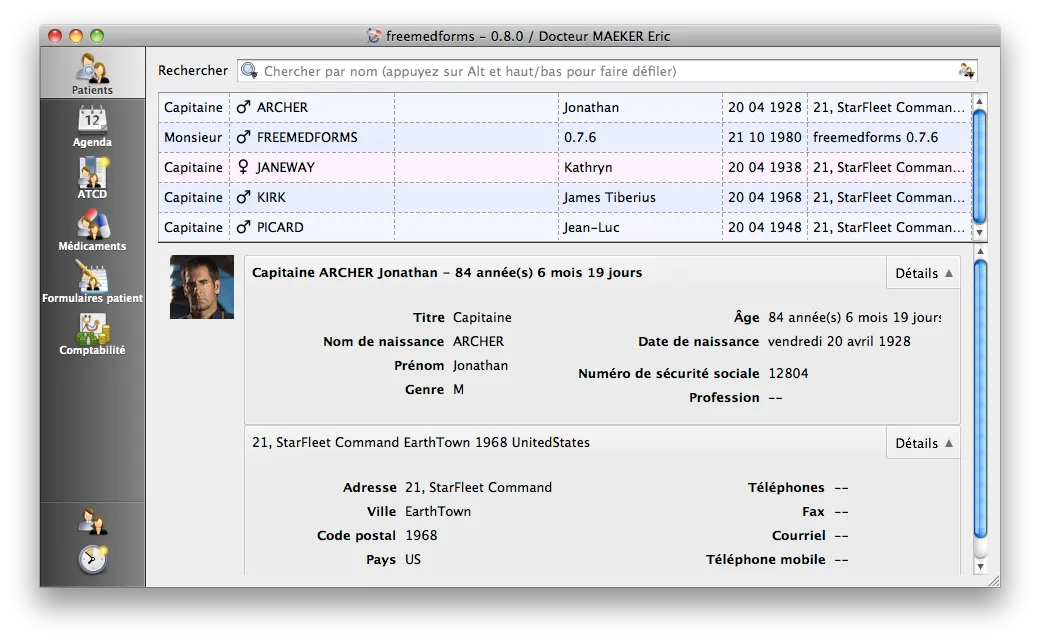
FreeMedForms is a free, open-source medical suite that is configurable and adaptable to various medical specialties. It includes an electronic medical record system, a prescription assistant, and emphasizes security, flexibility, and community support.


















